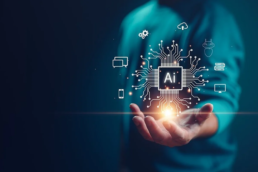Artificial intelligence (AI) is quickly becoming a crucial part of many businesses. AI can be used to automate processes, improve customer service, and even generate insights from data. This blog post will discuss how businesses can leverage AI to optimize their operations and processes.
The first step to leveraging AI is to understand the technology and its capabilities. AI is a set of algorithms and software that can “learn” from data sets and recognize patterns, allowing it to predict outcomes or complete tasks autonomously. This allows businesses to automate certain processes, such as customer service, data analysis, and even marketing. AI can also be used to detect anomalies, identify trends, and even generate insights from data.
Once you’ve determined how AI can be used to benefit your business, it’s time to start implementing it. This may involve integrating AI into existing systems or developing custom solutions. It’s important to keep in mind that AI is an evolving technology, and its capabilities will continue to grow. It’s also important to make sure that your AI systems are secure and compliant with relevant regulations.
AI can also be used to improve customer service and make it more efficient. AI-powered chatbots can be used to answer customer inquiries quickly and accurately, freeing up customer service agents to handle more complex issues. AI can also be used to analyze customer data to identify trends and suggest products and services that may be of interest to customers.
Finally, AI can be used to automate tedious and time-consuming tasks, such as data entry and analysis. This allows businesses to focus on higher-value activities, such as strategic planning and innovation. By leveraging AI technology, companies can save time and money, while also improving customer satisfaction.
AI is an incredibly powerful technology that can be used to streamline operations and improve customer service. Companies that embrace this technology now will be well-positioned to take advantage of the opportunities it provides in the future.




